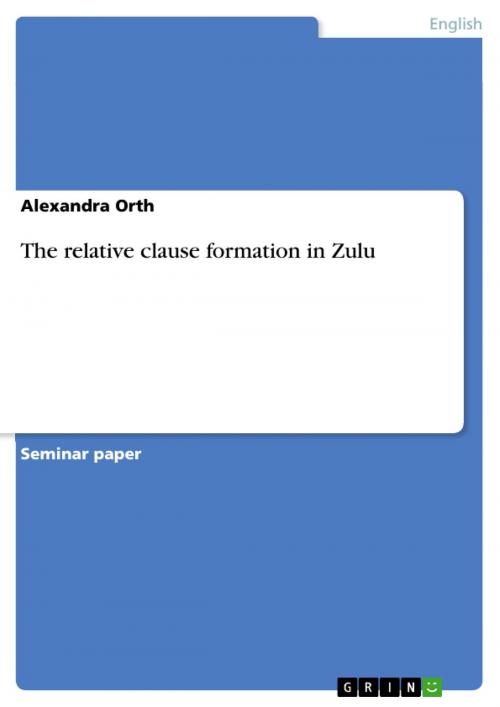| Author: | Alexandra Orth | ISBN: | 9783640911400 |
| Publisher: | GRIN Verlag | Publication: | May 9, 2011 |
| Imprint: | GRIN Verlag | Language: | English |
| Author: | Alexandra Orth |
| ISBN: | 9783640911400 |
| Publisher: | GRIN Verlag |
| Publication: | May 9, 2011 |
| Imprint: | GRIN Verlag |
| Language: | English |
Seminar paper from the year 2009 in the subject English Language and Literature Studies - Linguistics, grade: 2,0, University of Freiburg (English Seminar), course: HS: Grammaticalization, language: English, abstract: My term paper deals with one of the South African languages, the Zulu language. In my grammar report, accompanying the seminar, I already dealt with the Zulu language more precisely I tried to explain the phenomenon of the Zulu noun. Besides our seminar, the motivation and idea to deal with this topic has arisen from my personal experiences. Since I lived and worked approximately five months in South Africa last year. The Zulu language aroused my interest because it differs from all languages I know, but nevertheless it includes English words or word parts. This time, in my term paper, I will try to discuss the way of forming a relative clause in Zulu. This formation usually involves a prefix, also called relative concord, which is attached to the predicate of a relative clause. A relative clause is a subordinate clause that modifies a noun. Generally in most European languages, a relative clause is introduced by a relative pronoun, which belongs to a special class of pronouns. 'In other languages, relative clauses may be marked in different ways: they may be introduced by a special class of conjunctions called relativizers; the main verb of the relative clause may appear in a special morphological variant; or a relative clause may be indicated by word order alone. In some languages, more than one of these mechanisms may be possible.' Since relative clauses in Zulu were formed in a different way than in most European languages I would like to examine this problem in more detail.
Seminar paper from the year 2009 in the subject English Language and Literature Studies - Linguistics, grade: 2,0, University of Freiburg (English Seminar), course: HS: Grammaticalization, language: English, abstract: My term paper deals with one of the South African languages, the Zulu language. In my grammar report, accompanying the seminar, I already dealt with the Zulu language more precisely I tried to explain the phenomenon of the Zulu noun. Besides our seminar, the motivation and idea to deal with this topic has arisen from my personal experiences. Since I lived and worked approximately five months in South Africa last year. The Zulu language aroused my interest because it differs from all languages I know, but nevertheless it includes English words or word parts. This time, in my term paper, I will try to discuss the way of forming a relative clause in Zulu. This formation usually involves a prefix, also called relative concord, which is attached to the predicate of a relative clause. A relative clause is a subordinate clause that modifies a noun. Generally in most European languages, a relative clause is introduced by a relative pronoun, which belongs to a special class of pronouns. 'In other languages, relative clauses may be marked in different ways: they may be introduced by a special class of conjunctions called relativizers; the main verb of the relative clause may appear in a special morphological variant; or a relative clause may be indicated by word order alone. In some languages, more than one of these mechanisms may be possible.' Since relative clauses in Zulu were formed in a different way than in most European languages I would like to examine this problem in more detail.















